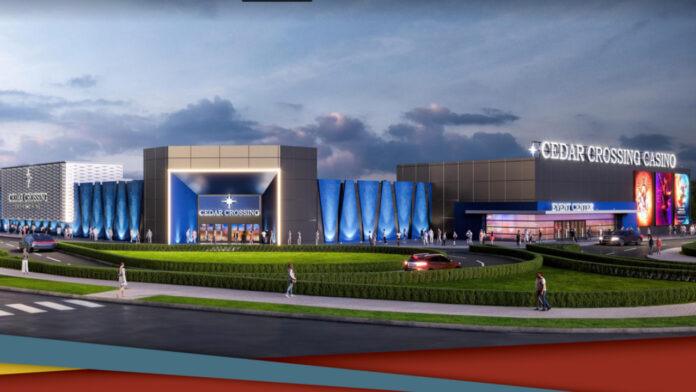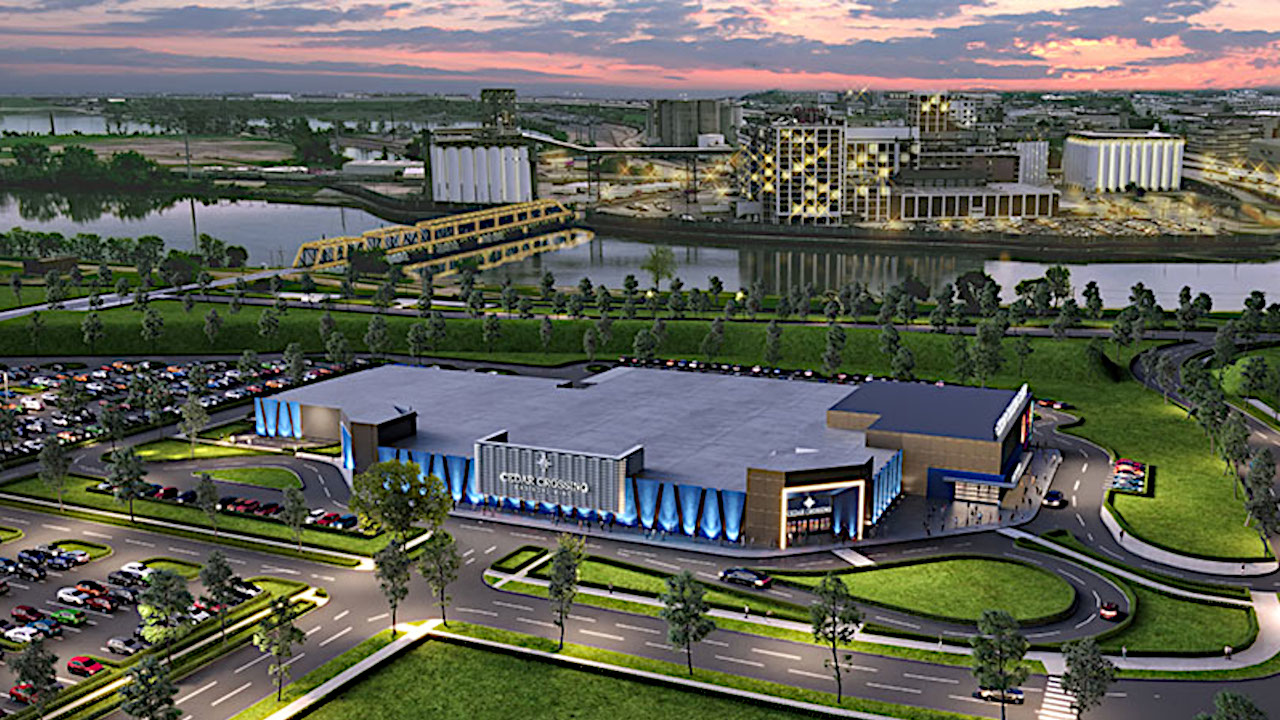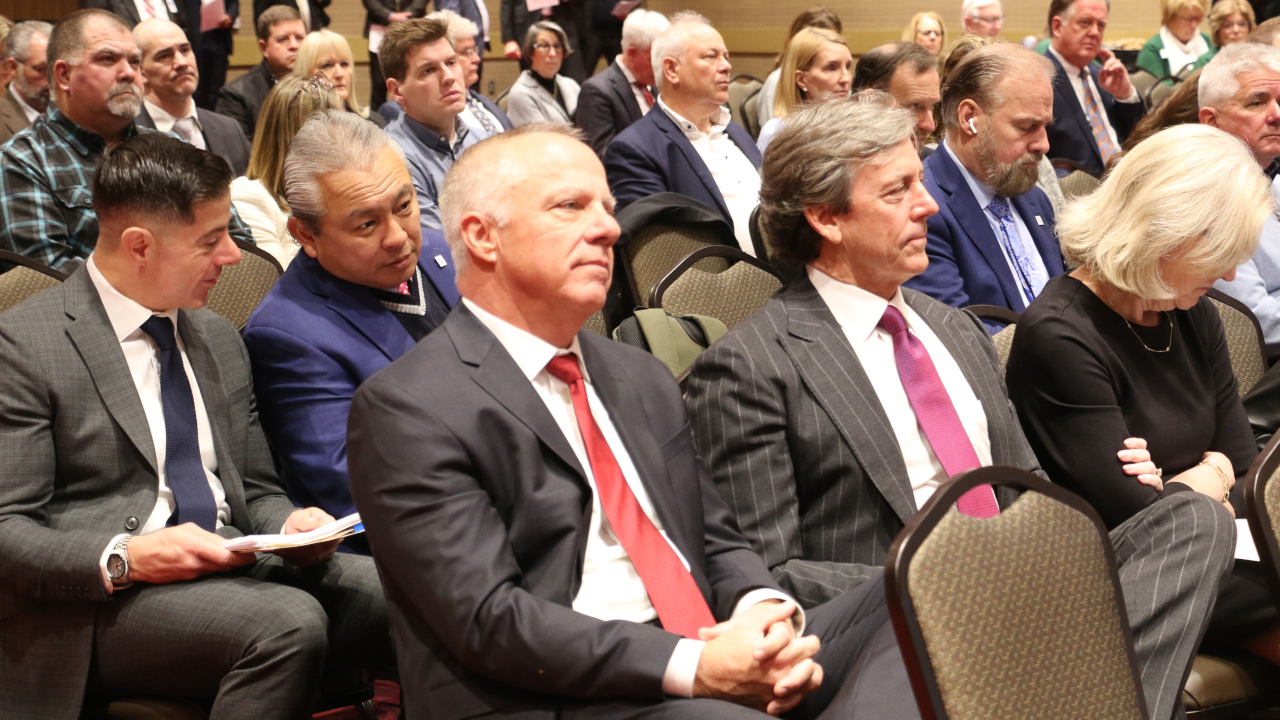
For both supporters and opponents of the effort to bring a state-licensed casino to Cedar Rapids, today marks the culmination of months of heated debate, market studies and exhaustive meetings.
Read the latest story:
At its meeting beginning at 8:30 a.m., the Iowa Racing and Gaming Commission (IRGC) will finally decide whether to issue a gaming license to the Cedar Rapids Development Group and Linn County Gaming Association to build a new, $275 million Cedar Crossing casino along the west bank of the Cedar River.
The final potential obstacle to the commission’s decision was essentially eliminated Feb. 4, when a proposed five-year casino moratorium hit a roadblock Tuesday in the Iowa Senate after sailing through the House.
Sen. Ken Rozenboom, R-Oskaloosa, said Tuesday there is not sufficient support for the moratorium among Senate Republicans, and he chose not to debate the bill at a State Government Committee meeting.
House File 144, passed by the Iowa House last week, would have set a five-year moratorium on new licenses for casinos in addition to setting new standards for the Iowa Racing and Gaming Commission to consider when assessing future license applicants.
Under the moratorium, the IRGC would have been barred from issuing licenses for casinos projected to impact the adjusted gross receipts of an existing Iowa casino by more than 10%. The bill also would have banned new applications from counties where a casino application was denied for eight years.
But that proposed moratorium is just the latest chapter in the campaign to bring Iowa’s 20th state-licensed casino to Cedar Rapids.
Casino plans outlined

Developers and supporters first unveiled plans for a Linn County casino in Cedar Rapids, dubbed “Cedar Crossing,” in May 2022.
If approved, the casino will be built on city-owned property between F and I avenues NW and First and Fifth streets NW. Most of that property was previously occupied by the Cooper’s Mill restaurant and Best Western Hotel before those facilities were demolished due to damages sustained in the 2008 flood, and the property was subsequently acquired by the city.
The city has designated the Cedar Rapids Development Group as their preferred casino developer.
Jonathan Swain, president of Peninsula Pacific Entertainment (P2E), the group that would operate the new casino, said in September 2024 that Cedar Crossing, projected to encompass 160,000 square feet and more than 1,100 on-site parking spaces, will feature three live entertainment spaces, including a 1,500-seat venue “that will host top-tier performances and events drawing visitors from across the state and beyond.”
The venue could also host sporting events, comedy shows, special events, festivals and trade shows.
“We want to draw people with entertainment, with hundreds of live performances a year,” said Mr. Swain, whose company has also developed other casinos across Iowa. “That is our experience in Sioux City, that is our experience in Dubuque. That tells us that that helps lift businesses downtown, especially hotels, bars and restaurants, bringing people to see our shows and have them stay overnight at a downtown hotel and visit businesses here. That’s what it’s all about. A high tide raises all boats.”
Mr. Swain outlined plans for three new restaurants at Cedar Crossing – Zach Johnson’s Clubhouse, developed with the PGA golfer and Cedar Rapids native, featuring steaks, chops and craft cocktails; World’s Fair, offering street foods such as Indian street tacos, Korean crispy chicken, Mediterranean wraps, crepes and churros; and the River’s Edge Smokehouse and Tap, with pub burgers, pulled pork, beef brisket and barbecued ribs.
He also introduced plans for a dedicated arts and cultural center, the first of its kind at an Iowa casino. The venue would feature rotating exhibits in partnership with the National Geographic Society, and would occasionally be transformed into a STEM (Science, Technology, Engineering and Mathematics) lab accessible to local students, as part of a partnership with 2020 Miss America Camille Schrier.
Casino application process

The door was opened for a new Linn County gaming license application after a two-year state gaming license moratorium imposed by the Iowa Legislature expired in June 2024, and the IRGC indicated it was willing to accept new license applications.
As a result, a formal license application was filed jointly in August by P2E, which would operate the proposed Cedar Crossing Casino, and the nonprofit Linn County Gaming Association.
The IRGC had twice rejected casino proposals for Linn County, in 2014 and 2017, after commissioners largely sided with opponents who argued the state’s gaming market was saturated and a new Linn County casino would “cannibalize” revenue from existing state-licensed casinos.
However, all five current IRGC members are newly-appointed since the 2017 decision, raising hopes that opinions on a Cedar Rapids casino could change.
Linn County voters approved a casino referendum in 2013, and a second referendum approved by voters in November 2021 allows developers to seek a casino license for the county in perpetuity.
Proponents also said the project would also provide new construction work for Cedar Rapids trades professionals, and in October 2021, the Cedar Crossing team signed a memorandum of understanding (MOU) with Cedar Rapids/Iowa City Building and Construction Trades Council. The MOU outlined the intention for CRDG to enter a project labor agreement once plans are finalized, contingent in part on receiving a gaming license from the IRGC.
Studies provide perspective on casino impact

Several studies have provided perspectives on a new Cedar Rapids casino, and its potential statewide impact.
An economic impact study by Decision Innovation Solutions, commissioned by P2E and released in January, projected a Cedar Crossing impact of $257 million during the construction phase and $183 million in the first year of operations. In total, the study projected $2.25 billion in total impact from construction through the first 10 years of casino operations.
And a study by Convergence Strategy Group, also commissioned by P2E, indicated that Cedar Crossing would generate $108 million in gaming revenue annually, $80.2 million of which would be new revenue for the state.
The study said casino construction will create the equivalent of 1,100 full-time jobs over its 18-month construction window, with over half that work going to Linn County residents. Construction would generate $303 million in additional spending in Iowa, including $102 million in wage earnings. Once operational, the casino would create 300 on-site jobs, with 224 more ancillary jobs in the community.
Projections also indicated the new casino will draw more than 1.1 million visitors to Cedar Rapids per year and generate wagers of more than $100 million annually, as well as $66 million in ancillary spending.
The casino would generate $33.5 million in total revenues to the community each year, including $23.9 million in annual gaming taxes, according to the Convergence study, which also asserted the Cedar Rapids market was dramatically underserved by the state’s current casinos.
And according to that report, the “cannibalization” impact on existing casinos would be much less than previous reports have indicated – a drop of about $3 million per year at the Riverside Casino by the year 2029, and the casinos in Waterloo and Dubuque would actually see higher revenues.
However, other reports raised potential concerns with a new Cedar Rapids casino.
A pair of studies commissioned by the IRGC to examine the overall Iowa gaming market – and the impact of a proposed new Cedar Rapids casino complex on that market – painted a mixed picture, extolling several virtues of the new casino proposal while warning of an overall downturn in Iowa casino proceeds in recent years and the revenue “cannibalization” of a new casino on existing casinos, particularly in Eastern Iowa.
The two studies were conducted by Marquette Advisors of Minneapolis and The Innovation Group of New Orleans and presented to the IRGC in January.
The Marquette Advisors study indicated Iowa’s casino market is mature, with 19 commercial casinos and four tribal casinos already in operation. It included profiles of each of the state’s 23 casinos and noted that Iowa is considered a “slow-growth” market in terms of population.
The study indicated that the Cedar Crossing Casino “is attractively designed and well located, such that we expect it will be successful in drawing large numbers of Iowa gamblers, especially ‘locals’ along with smaller numbers from the broader region and tourists.”
“We expect the new casino would become the dominant gaming facility with respect to the Linn County (Cedar Rapids) market and will be very competitive with respect to other nearby markets, especially Johnson County (Iowa City),” the study said.
Cedar Crossing would generate $118.1 million in gross revenue by fiscal year 2029, the study projects. However, “The level of cannibalization will be substantial for the nearby Riverside, Isle-Waterloo and Meskwaki casinos,” the report said, and estimated to reduce revenue at nearby casinos by $68 million, primarily affecting Riverside Casino (a loss of $34 million, 26% of its adjusted gaming revenue or AGR) and Isle-Waterloo (a loss of $8.8 million, or just under 10% of its AGR).
The Innovation Group study used a drivetime gravity model, which estimates casino patron behavior based on travel distance and competing venues. It also accounted for new and upcoming casino developments in neighboring states, including Nebraska, Illinois, and Wisconsin, which are expected to intensify competition for Iowa’s casinos.
According to the Innovation Group study, the Iowa gaming market was valued at $1.97 billion in the 2024 fiscal year. Assuming a new Cedar Crossing casino begins operation in fiscal year 2027, the state’s gaming revenue is projected to grow to $2.23 billion by fiscal year 2028, with increased competition from casino developments in Nebraska and Illinois
Similar to the Marquette Advisors study, it indicated that Cedar Rapids showed strong casino market potential, with a projected annual net gaming revenue (NGR) of $116.6 million if a new Cedar Rapids casino were introduced.
That revenue would result in a net state revenue gain of $60 million, despite a projected $56 million cannibalization of existing casinos, according to The Innovation Group report.
Proponents, opponents debate casino’s impact

While touting the casino’s employment and amenities, proponents have also pointed to casino developers’ plan to give 8% in annual net gaming revenue – the highest percentage in the state – to fund local nonprofits. Iowa law mandates that regulated licensed casinos set aside a minimum percentage of revenue to fund nonprofit organizations.
The COVID-19 pandemic and derecho have put more financial stress on local nonprofits, and LCGA president Anne Parmley has said contributions from a casino will provide a much-needed source of funding to assist Linn County in managing future needs.
“From the beginning, we’ve said a Linn County casino will help our communities be more vibrant places to live,” Ms. Parmley said. “We believe we can do more and be more – and the $5 to $7 million dollars in annual net gaming revenue that we can commit to funding local nonprofits is our way to show our commitment to lifting Linn County as a better place to live, work and visit.”
However, several casino operators, particularly the Riverside Casino and the Isle Casino in Waterloo, have argued that a new competitor in Cedar Rapids would dramatically curtail their revenues, forcing layoffs and reducing their contributions to nonprofit organizations in their respective areas.
Conversely, a Des Moines-based group launched a campaign in November against the effort to obtain a Cedar Rapids casino license.
Iowans for Common Sense, which billed itself as “a grassroots coalition dedicated to preserving the integrity of Iowa’s communities,” called on area residents to stand against the push for a new casino in Cedar Rapids.
“The message from Iowans is clear,” Iowans for Common Sense spokesperson Zachary Harnden said. “People across the state value what our current casinos bring to their communities but do not support further expansion. Cedar Rapids residents, in particular, are firmly opposed, and we’re here to support them in amplifying their voices.”
The group claimed that a study conducted by UpONE Insights, an Arlington, Virginia-based polling and research firm, indicates that while a majority of Iowans are in favor of casino gambling in the state overall, two-thirds of Iowa residents oppose new casinos, and 53% of Cedar Rapids residents are against a new casino in Cedar Rapids.
The study, which UpONE indicated was based on a random telephone survey of 500 Iowa residents in September, also asserted that 56% of voters across Iowa support a moratorium on further casino expansion.
Casino proponents have claimed the group is largely financially supported by the state’s existing casinos, especially Riverside Casino.
In addition, a petition seeking to block the commission’s consideration of a Linn County gaming license was turned away by the IRGC in November.
The petition, filed Nov. 8 by the Riverboat Casino and Golf Resort and the Washington County Riverboat Foundation, claimed that the wording of the 2021 Linn County ballot measure that permanently authorized gaming in Linn County was faulty under Iowa state code and that, as a result, the IRGC “lacks authority to issue a gambling games license in Linn County.”
The commission voted 4-1 to decline to consider the petition, after attorneys on both sides of the petitions presented arguments for their cases.




